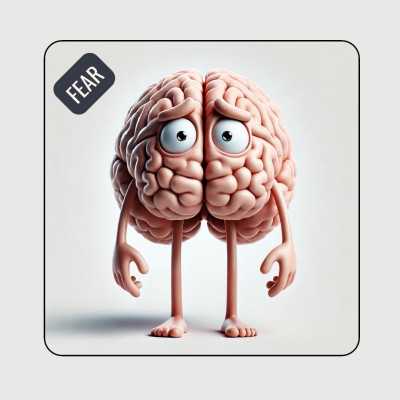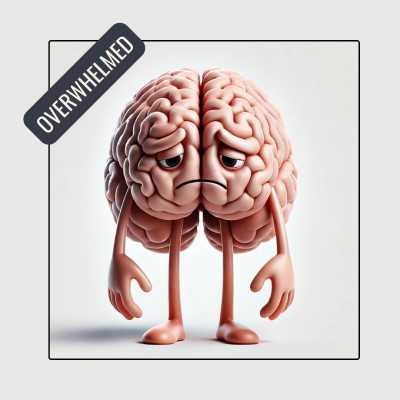Emotional Triggers | How Past Experiences Shape Present Reactions
Emotional triggers are powerful. They can make us feel like we're suddenly transported back to a different time and place, reacting with emotions that seem far more intense than the current situation warrants. You might have experienced this yourself - one moment you’re calm, and the next, something small sets off a flood of emotions. You might wonder, "Where did that come from?" The answer often lies in our past.
Understanding emotional triggers is a key part of self-awareness and personal growth. By unpacking these triggers, we can learn how our past experiences shape our present reactions, allowing us to respond to situations more consciously rather than being controlled by our emotions.
What Are Emotional Triggers?
Emotional triggers are stimuli - events, words, behaviors, or situations - that evoke a strong emotional response. These responses can range from anger and sadness to anxiety or fear. Triggers can be specific to each person, shaped by their unique experiences, memories, and emotions. For example, someone who was criticized harshly as a child might feel intensely hurt or defensive when receiving even mild feedback as an adult. The feedback, in this case, is a trigger that brings up past feelings of inadequacy or fear of rejection.
The Connection Between Past Experiences and Present Reactions
Our emotional responses are deeply rooted in our past. The way we were treated, the environments we grew up in, and the experiences we had all contribute to how we respond to situations today. These past experiences leave emotional imprints on us, shaping our beliefs, attitudes, and reactions.
When something in the present reminds us of a painful or unresolved experience from the past, our brain often reacts as though we are facing that old threat again. This reaction can happen so quickly and automatically that we might not even be aware of the connection to the past. Let’s break down this process:
Memory and Associations
Our brains store memories not just as events, but also with the emotions attached to them. When we encounter something that reminds us of a past event, our brain retrieves not only the memory but also the associated emotions. For instance, if you were often ignored in your childhood, being ignored in a conversation today might trigger feelings of insignificance or hurt, even if the current situation is entirely different.
Conditioned Responses
Over time, we develop conditioned responses to certain stimuli. If a particular experience was traumatic or overwhelming, similar situations in the future can trigger a similar emotional response, even if the new situation isn’t as threatening. This is why someone who experienced betrayal might find it hard to trust others, reacting with suspicion or fear in situations where trust is required.
Unresolved Emotions
Often, the emotions triggered by past experiences remain unresolved because we didn’t have the tools, understanding, or support to process them at the time. These unresolved emotions can lie dormant, only to be reactivated by similar experiences later in life. This is why old wounds can feel fresh when something stirs them up.
Why Understanding Your Triggers Matters
Understanding your emotional triggers is crucial for several reasons:
- By recognizing what triggers you, you gain insight into your emotional landscape. This self-awareness is the first step toward managing your reactions rather than being controlled by them.
- Emotional triggers can strain relationships. When you react strongly to something, it can confuse or upset others who don’t understand why you’re so affected. By understanding and communicating your triggers, you can build stronger, more empathetic connections with others.
- Unpacking your triggers allows you to address unresolved emotions from your past. This process can lead to healing, growth, and a greater sense of peace.
How to Identify and Manage Your Triggers
The journey to understanding and managing your triggers begins with curiosity and self-compassion. Here’s how you can start:
Reflect on Your Reactions
Pay attention to moments when your emotional response seems out of proportion to the situation. Ask yourself, "What does this remind me of?" or "When have I felt this way before?" This reflection can help you identify patterns and connect them to past experiences.
Journal Your Experiences
Writing down your thoughts and feelings can be incredibly helpful in understanding your triggers. Journaling allows you to explore your emotions in a safe space, uncovering connections between your past and present reactions.
Practice Mindfulness
Mindfulness involves staying present and observing your thoughts and feelings without judgment. When you feel triggered, take a moment to pause and breathe. This can help you create a space between the trigger and your reaction, giving you the chance to choose a more conscious response.
Seek Support
Sometimes, unpacking emotional triggers can be overwhelming. Therapy or counseling can provide a supportive environment to explore these triggers and work through unresolved emotions. A trained professional can help you navigate this process, offering tools and techniques to manage your triggers effectively.
Communicate with Others
If certain triggers are related to your interactions with others, it can be helpful to communicate your needs and boundaries. For instance, if you’re triggered by certain comments, let the people around you know how those comments affect you. This can foster understanding and reduce the likelihood of being triggered in the future.
Moving Forward with Compassion
Understanding your emotional triggers is not about blaming yourself or others for the way you react. Instead, it’s about gaining insight into why you feel the way you do and using that knowledge to respond in ways that align with your values and goals. It’s about taking back control of your emotional world, rather than letting old wounds dictate your present.
This journey requires patience and self-compassion. You’re peeling back layers of your emotional history, and that takes time. But with each layer you uncover, you get closer to a more peaceful, conscious, and empowered self. In conclusion, our past experiences play a significant role in shaping our present reactions.
By unpacking these emotional triggers, we can better understand ourselves, heal from past hurts, and create healthier, more intentional responses to the challenges we face today. As you continue on this journey of self-awareness, remember to be gentle with yourself - you’re doing important work that will benefit not just you, but everyone around you.






Leave a comment